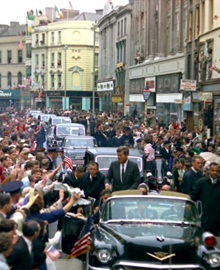
IRISH TRAVEL & CULTURE GUIDE
SUMMER 2013
June 2013
PRESIDENT KENNEDYíS LAST VISIT TO IRELAND
It was a magical journey, the trip of a life time, a joyous homecoming. President John F. Kennedy’s visit to Ireland in June, 1963 captured the world’s imagination and recharged the relationship between the United States and Ireland as never before.
For the people of Ireland, the Kennedy visit was a point of pride - perhaps a vindication of sorts - that a descendant of the Famine generation, forced to flee Ireland in the 1840s, had returned more than a century later, as the most powerful leader in the free world. The visit shone a spotlight on a struggling, newly minted republic, still divided, and unsure of its place in the world. The visit, diligently covered by the American press corps and world media, gave Ireland a cameo role in the unfolding Kennedy saga.
For President Kennedy the trip was a respite from a turbulent world in which he faced daunting challenges. JFK had been to Ireland before, in the 1940s, but this trip, with his sisters Jean Smith and Eunice Shriver in tow, along with his close Irish-American advisors, turned out to be the gathering of all gatherings, as his cousins from Wexford and Limerick – along with millions of Irish - greeted him with unabashed pride.
The trip was not without drama. A month before JFK was expected a squabble broke out in Ireland between folks from New Ross, Wexford, where the Kennedy family had originated and Dublin government officials, over where President Kennedy would spend most of his time.
“We feel the President is being hijacked all over the country,” a spokesman from New Ross told the press. “President Kennedy would prefer to stay longer with his kith and kin in the New Ross area instead of attending banquets and garden parties in Dublin.”
But those problems were ironed out by the time JFK arrived on the evening of June 26, directly from his now famous trip to Berlin, where he uttered the memorable words, “Ich bin ein Berliner.” At Dublin Airport, Irish President Eamon deValera greeted him in Irish, “the language of your ancestors,” and then stated with poignant conviction, “We are proud of you Mr. President. We admire you for the leadership you have given.”
SPEAKING OF FREEDOM
And true to form, Kennedy spoke of the big issues of his time: the struggle for freedom, the dangers of tyranny and the rights of man. He made frequent reference to Ireland’s own struggles in the context of small nations being swallowed up by larger empires.
“Ireland in its experience has one special significance,” he said in Wexford Town on June 27. “Ireland showed, that it was possible for a people over hundreds of years, of foreign domination and religious persecution, to maintain their national identity and their strong faith. And therefore, those who may fear that in these difficult times, who may believe that freedom may be on the run, or that some nations may be permanently subjugated and eventually wiped out, will do well to remember Ireland.”
The trip was chock full of pageantry and ceremony, as President Kennedy and his entourage rushed through New Ross, Dunganstown and Wexford Town, back and forth to Dublin, and down to Cork, Galway and Limerick, all within the space of four days. But there was also a certain casualness and intimacy that marked the trip too, as JFK and his family moved with ease among politicians, cardinals and judges and among regular people he met every step of the way.
THE IMMIGRANT STORY
All eight of JFK’s great grandparents left Ireland in the space of a few months and came to Boston in the 1840s, and President Kennedy knew, in a manner that was both sentimental and authentic, that the descendant Irish immigrants “kept a special place in their memories, in many cases their ancestral memories, of this green and misty island.
“All of us of Irish descent are bound together by the ties that come from a common experience; experience which may exist only in memories and in legend, but which is real enough to those who possess it.”
Dave Powers later said that the Ireland trip was “the happiest four days of John F. Kennedy’s life,” a sentiment echoed by the president’s siblings and close friends over the years.
President Kennedy’s historic visit also cemented an important new relationship between Ireland and the United States. On this trip, Kennedy and deValera announced the formation of the Irish American Foundation, which Irish journalist Brendan Malin described as “a two-nation Marshal Plan.” It encouraged cultural and educational exchange, and offered to share America’s technological, scientific and medical knowhow.
The Foundation – and certainly its spirit and original intent – continues today thanks to the work of the many American Ireland Fund, Irish-American Partnership, USIreland Alliance and other philanthropic groups that look to help Ireland.
You can find wonderful details of President Kennedy’s trip to Ireland by visiting the John F. Kennedy Presidential Library & Museum in Boston.
